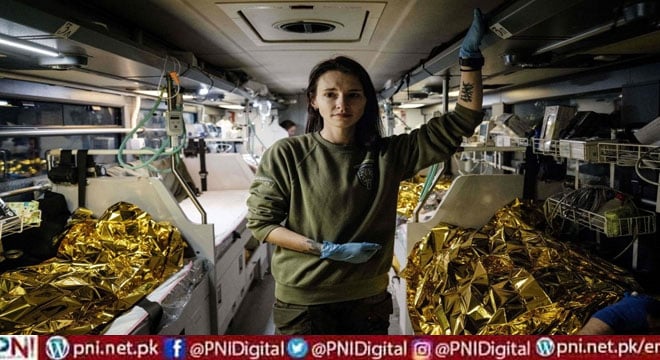Pavlohrad, Ukraine, Feb 13 (AFP/APP): At a hospital a short drive from the scene of fierce fighting between Ukrainian and Russian troops in eastern Ukraine, two orderlies carefully carry an injured soldier onto a medical bus.
Four others soon join him on individual beds on board, while another four walking wounded using crutches limp up the steps to their seats.
The vehicle — emblazoned with sunflowers, the national symbol of Ukraine — is becoming a familiar sight on the main roads to and from the frontline in the east.
From the outside, it looks like any other long-distance coach criss-crossing the barren countryside.
It is however packed with the latest medical equipment and machines to help keep the most seriously injured troops alive.
The volunteer paramedics on board mostly see devastating injuries caused by mines, bullets and shrapnel, said Dmytro Sachkov, a trainee doctor whose studies were interrupted by the conflict last year.
The soldiers have already been evacuated from the battlefield by the military to local hospitals but need moving for longer-term or more specialist treatment elsewhere.
“We’ve never lost a patient on the way to hospital,” said the final-year medical student, 24, who goes by the call-sign “Dok”.
“Every day we get a call out. In one week, we’ve brought out 62 people,” he told AFP.
The coach is operated by the Ukrainian Hospitallers “medical battalion”, which was set up in 2014 when Russia annexed Crimea.
The organisation and its fleet of small donated ambulances are staffed by volunteer paramedics from Ukraine and around the world.
In the disputed Donbas region, the Hospitallers coach often makes multiple round trips in a single day to and from hospitals near the frontline.
“It depends on the intensity of the fighting on the frontline,” said Sachkov.
He is wearing military fatigues with a first aid kit — rather than a holster — strapped to his leg.
“We’re ready to make as many trips as possible but this is not a usual evacuation vehicle and it’s difficult to drive it on bad roads.”
Heading west towards Pavlohrad in the Dnipropetrovsk region, the coach inches its way slowly over railway crossings.
It dodges potholes to give its fragile passengers the smoothest ride possible.
The five most seriously injured lie under gold foil insulating blankets, hooked up to machines monitoring their vital signs.
Yuriy Popenko, 37, was wounded by a mine near the city of Bakhmut that Russian troops have been trying to seize for over six months.
Both his heels are shattered.
At the back of the coach, Vasyl Yavtushenko’s face is peppered with blast fragments and his hands are heavily bandaged.
“I have very deep wounds,” he explained.
“If the doctors sew me up, it will be quicker but I think that rehabilitation will take up to a month.”
Follow the PNI Facebook page for the latest news and updates.









